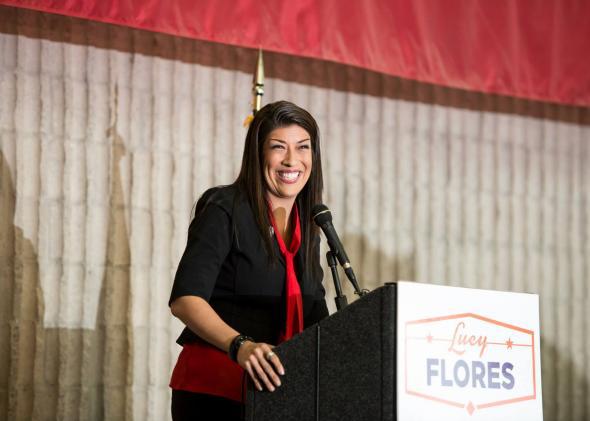Midterm elections are heating up, and the race for lieutenant governor in Nevada is shaping up to be one of the more interesting statewide battles of the year. It’s not just because there’s a slight chance that the winner of the race could become governor if the current one (Republican Gov. Brian Sandoval, set for an easy re-election) manages to successfully challenge Sen. Harry Reid for his seat in 2016, but also because the Democratic nominee, a state representative in Nevada, bucks a stunning array of expectations that people have for politicians: Lucy Flores grew up poor, dropped out of high school, has done time in prison, and has a regrettable ankle tattoo. Oh yeah, and she’s open about having had an abortion.
Benjy Sarlin of MSNBC profiled Flores over the weekend and concludes that none of this is holding her back from becoming a rising star in the Democratic party. On the contrary, Flores campaigns heavily on her biography—after a rough start, she got a GED and eventually a scholarship to USC that led to a career in law and now politics—and she connects it all to the policies she fights for. Example: She talks about her own horror story of having to flee an abusive boyfriend when pushing for a state law allowing domestic violence victims to break their leases. An even more remarkable example: Flores admitted that she had an abortion at 16 during a debate over a bill to improve sex education in schools. After pointing out all six of her sisters (Flores is one of 13 children) got pregnant as teens, Flores went on to talk about her own life:
“Since I’m sharing so much this session, I might as well keep going,” she said. “I always said that I was the only one who didn’t have kids in their teenage years. That’s because at 16, I got an abortion.”
Her eyes welled up and her voice caught as she described how she’d convinced her father to pay the $200 cost for the procedure. She didn’t want to end up like her sisters, Flores told him.
“I don’t regret it,” she said. “I don’t regret it because I am here making a difference, at least in my mind, for many other young ladies and letting them know that there are options and they can do things to not be in the situation I was in, but to prevent.”
Admitting that you personally have had an abortion is almost unheard of in politics. Democratic Rep. Jackie Speier talked about her abortion on the floor of the House in 2011, but that termination was done out of medical necessity, which is traditionally assumed to be a more sympathetic reason to abort. Flores admitted to the most controversial kind of abortion, the kind done simply because a woman does not want to have a baby at that time. Unsurprisingly, Flores was bombarded with abuse and shaming from anti-choicers.
Despite this, Democratic leaders and local political observers, Sarlin writes, don’t think Republicans will be able to attack Flores over the abortion or any other biographical details she has shared, at least not without it backfiring “if a less-than-sensitive critic decides to take up the issue.”
Even many Republicans agree that going after Flores for her past is a bad idea. “I don’t think it would be wise for anyone to get into the mud about (Flores’s) former life,” GOP strategist Robert Uithoven told Sarlin. Polling data supports this idea, showing that 59 percent of people like Flores more after hearing her life story and only 17 percent like her less. Turns out that it’s one thing to describe a generic woman as “selfish” if she has an abortion, but putting an abortion in the context of a woman’s life story makes her much harder to attack—and her choice much easier to understand.
